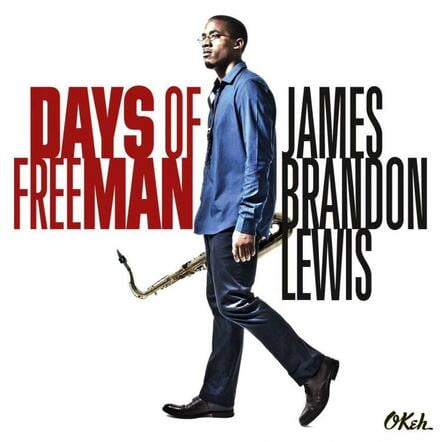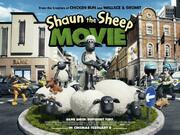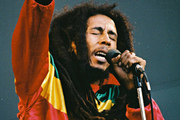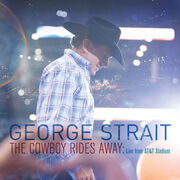New York, NY (Top40 Charts) Visionary composer and tenor saxophonist
James Brandon Lewis's bravest, yet most palpable artistic feat, Days Of FreeMan, opens with a poignant and profound introductory monologue from a maternal sage. She says: "The best thing of living is living who you are. You can't be somebody else; you gotta be what God gave you to be and who you are. You look in the mirror and see yourself and say 'I'm
James Brandon Lewis."' Next, bass and drums congeal around the sapphire melodic motif of "Brother 1976," recalling one of those jazzy jewel-like hooks from a 1990s Native Tongue hip-hop jam. The effect is like 1990s hip-hop's fascination with jazz being spit back by a prodigious jazz innovator. Welcome to Days Of FreeMan (OKeh) available July 24, 2015.
For his third album,
James uses ideas from 1990s hip-hop to masterfully weave together threads of cultural identity, cross-generational identity, and personal reflection.
Days Of FreeMan is imaginatively organized in chapters with classic hip-hop style breaks and interludes functioning as chapter breathers. Like the cross cultural and generational mosaic on Freeman Street proper, the album invites the listener into many dialogues. It is a nod to 1990s hip-hop, and explores rhyme-scapes and the musical conventions of that golden age of hip-hop in a revolutionary way. The album also explores hip-hop as a culture through taking inspiration from the original four pillars of hip-hop: dance, rapping, graffiti, and DJ-ing.
The album also loosely functions as a memoir with an underlay of nostalgia for the carefree boyhood days of fly nicknames, basketball, and those first encounters with the transformative power of music. Adding to the power and emotionality of this thread on growing up, are pontifications on love, identity, and God peppered throughout the album, culled from informal conversations
James recorded with his grandmother,
Pearl Lewis.
James's immersive creative process to realize his vision for Days Of FreeMan include pouring over hip-hop documentaries for up to eight hours a day, and dissecting albums by KRS-One, Digable Planets, Pete Rock & CL Smooth, A Tribe Called Quest, Medeski,
Martin & Wood, along with fearless jazz trumpeter Don Cherry's 1985 album Home Boy and Lauryn Hill's 1998 masterpiece the Miseducation Of Lauryn Hill.
How all of this preparation plays out musically is stunning. For years instrumentalists held fast to the lofty notion of "singing through the instrument," but on Days Of FreeMan,
James aspires to MC through his tenor. The album's title track perfectly captures the clipped cadence of a master MC with speech-like phrases and a long flowing solo that conjures up a blazing freestyle battle rap session. "Black Ark" traces the legacy of hip-hop from the balmy and pioneering dub explorations of Lee "Scratch" Perry in
Jamaica ("Black Ark" is the name of his famed studio) to the burgeoning sounds of hip-hop blaring out in the Bronx. On "Lament for JLew," in five vigorous minutes
James ties together the dual lineages of classical music to hip-hop and classical music to rock using original classical-flavored motifs to illustrate the overlaps.
The second to last track of Days Of FreeMan is the political and timely "Unarmed With A Mic" and is a reminder of hip-hop's power as a form of protest music. On this track,
James plays with seething sentimentality. The album concludes with "Epilogue," a reprise of the infectious melody of the opening track "Brother 1976."
On the album,
James is accompanied by drummer Rudy Royston. Both took the weighty undertaking of album deeply, researching 1990s hip-hop jams for inspiration and vision. Their attention to the vocabulary of the era
James sought to explore, and their panoramic musicality and sympathetic musical skills, match James's artistic ideal to authentically and thoroughly fuse genres and cultures without pandering to trends in jazz-groove records. The record also features a guest spot from the gifted freestyle rapper
Supernatural on the track "Days Of FreeMan."
Days of FreeMan is one of
James Brandon Lewis's most ambitious works and his most accessible. Reflecting on this intriguing duality he says: "The artist is charged with taking creative risks, but the universe lined up this time and I was able to connect with my audience conversationally."
About
James Brandon Lewis
James Brandon Lewis is one of the modern titans of the tenor sax. Hailed by Ebony Magazine as one of "7 Young
Players to Watch,"
James has shared stages with such icons as Benny Golson, Geri Allen, Wallace Roney, Grammy® Award-winning singer Dorinda Clark Cole, and the late "Queen of Gospel Music," Albertina Walker. In bold contrast,
James has also worked with such intrepid artists as Weather Report bassist Alphonso Johnson,
William Parker, Gerald Cleaver, Charles Gayle, Ed Shuller, Kirk Knuffke, Jason Hwang, Marilyn Crispell, Ken Filiano,
Cooper Moore,
Darius Jones, Eri Yamamoto, Federico Ughi, Kenny Wessel, Marvin "Bugalu" Smith, and Sabir Mateen. In addition, he has collaborated with the dance company CircuitDebris under the direction of Mersiha Mesihovic.
James attended
Howard University and holds an MFA from California
Institute of the Arts.
Currently,
James resides in New York City where he actively gigs as a sideman and leads his own ensembles. In NYC, he is a co-founder of "Heroes Are Gang Leaders" with poet
Thomas Sayers Ellis—a collective of poets and musicians—and he is a member of the collective "Dark Matter," a conceptual musical collaboration exploring that which is invisible but is detected by it's gravitational effects. Outside NYC,
James is an active national and international touring artist. Some career highlights are playing such esteemed festivals as Winter Jazz Festival/OKeh Records showcase with
William Parker and Gerald Cleaver; The Eric Dolphy Festival with an ensemble featuring Grachan Moncur III, Richard Davis, Andrew Cyrille,
Angelica Sanchez, Ted Daniel, and Alfred Patterson; and Princeton University as part of Fred Ho's "Journey to the West," an interdisciplinary dance and music project.
Tracklisting:
1. Foreword
2.
Brother 1976
3. Of Dark Matter
4.
Black Ark
5. Break I
6. Days of FreeMan
7. Bird of Folk Cries
8. Break II
9. Wilson
10. Lament for JLew
11. Break III
12. Bamako Love
13. Boom Bap Bop
14. Steelo
15. Break IV
16. Able Souls Dig Planets
17. Speaking from Jupiter
18. Unarmed with a Mic
19. Epilogue (Brother 1976)
Website: https://www.jblewis.com
Twitter: https://twitter.com/jblewis1983
Facebook: facebook.com/JamesBrandonLewis
























